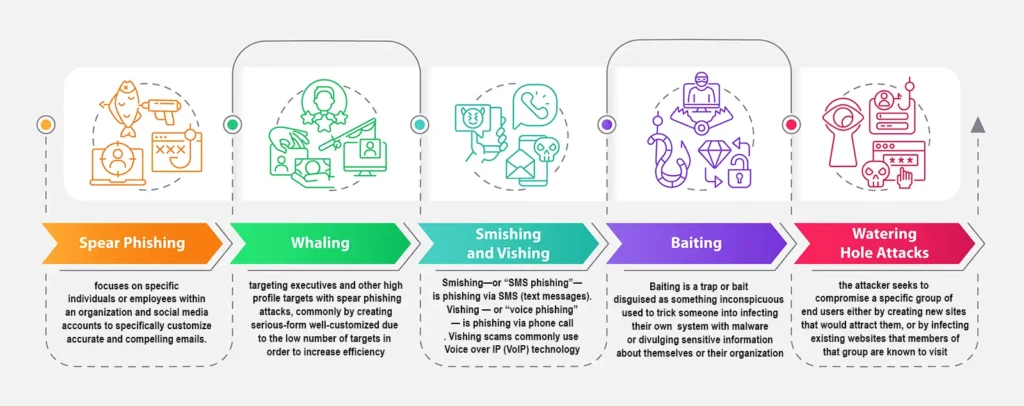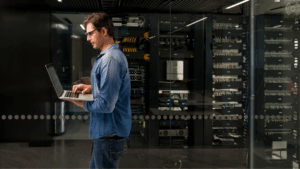The Power of Cybersecurity Training: Safeguarding Your Digital Assets
In an increasingly interconnected world, where cyber threats loom large, threat actors are smarter than ever, and data breaches make headlines. To combat this threat, we must take proactive measures to protect our digital assets. Cybersecurity training, in general, plays a pivotal role in equipping us with the knowledge and skills necessary to defend against cyberattacks, and maintain a more secure digital environment.
In 2021, 98% of cyberattacks relied on social engineering. According to PurpleSec (2021)
Social Engineering is a category of cyber threats focused on humans and their social behaviors. Right now, Social Engineering is the most prevalent attack vector because it preys on the uneducated person’s “likely” behaviors. Hackers use these behaviors to gain access to your systems and assets. The key to combating these Social Engineering threats is to educate, and thereby change that behavior.
In this article, we explore the compelling benefits of Cybersecurity Awareness Training as a tool to combat Social Engineering threats, and how they can provide measurable value in securing your organization.
Heightened Awareness and Threat Recognition
Cybersecurity Awareness Training serves as a powerful tool to educate your organization about the various types of cyber threats and attack vectors that they are exposed to. By educating on the latest techniques used by hackers, your staff becomes more adept at recognizing potential threats. These threats include phishing emails, malware, or social engineering attempts. Recognizing these threats means faster detection and reporting of suspicious activities, mitigating the risk of successful cyberattacks.

Exercising and Testing Knowledge
It’s critical to understand where your organization is in terms of Cybersecurity Awareness. Providing knowledge is the first step to increasing that awareness. But, exercising that knowledge is what really changes the behavior. The best way to exercise is through real world testing.
An effective CyberSecurity Awareness Training program includes the periodic testing of users with safe Social Engineering attacks, such as phishing emails, to record their actual behavior. Did the user click the link, or did the follow protocol and report it to the Security Team? Or did they at least delete it? Measuring the results of these exercises across your organization will give you the insights you need to continuously improve your stance against cyberattack.
Reducing Vulnerabilities and Improving Response
It’s not a matter of IF you will be hacked. It’s a matter of when. What is critical is how quickly and effectively you respond when it happens.
A well-trained workforce is a crucial line of defense against cyber threats. Cybersecurity Awareness Training equips your organization with the skills not only to identify the threats, but respond to them when they happen. And eventually, they will happen.
Another fundamental part of Cybersecurity Awareness is understanding the risks associated with the digital endpoints, a.k.a. the Desktops, Mobile Devices, Servers, and Online Services that are the foundations of your digital footprint. Understanding the importance of basic security fundamentals as password protection, timely patching, and regular backups is paramount. By exercising these fundamentals, your team contributes to a proactive security culture, and thereby reduce risk. Adopting automation tools and having dedicated resources to enforce behavior is the key.
Furthermore, training modules on incident response enable organizations to minimize the impact of an attack by swiftly containing and remedying the breach, mitigating potential financial and reputational damages.
Conclusion
Cybersecurity training is a pillar in safeguarding your organization against ever-evolving threats. By increasing awareness, strengthening defense strategies, and reducing vulnerabilities, organizations and individuals can significantly reduce the risks associated with cyberattacks. Investing in comprehensive cybersecurity training programs not only protects sensitive data, but also instills a “security-first” mindset among your staff. Remember, when it comes to cybersecurity, knowledge is power, and training is the key to unlocking it.
When it comes to cybersecurity, knowledge is power, and training is the key to unlocking it.
If you would like to discuss your current Cybersecurity posture, we are here to help. To get a no obligation consultation with a CMHWorks Cybersecurity expert, please feel free to reach us at info@cmhworks.com. Take a look at some of the managed security solutions we offer here.
Additional Information
- https://www.cshub.com/attacks/news/social-engineering-most-dangerous-threat-say-75-of-security-professionals
- https://cmhworks.com/solutions/cybersecurity/cybersecurity-awareness-training/
- https://www.eccouncil.org/cybersecurity-exchange/ethical-hacking/understanding-preventing-social-engineering-attacks/








